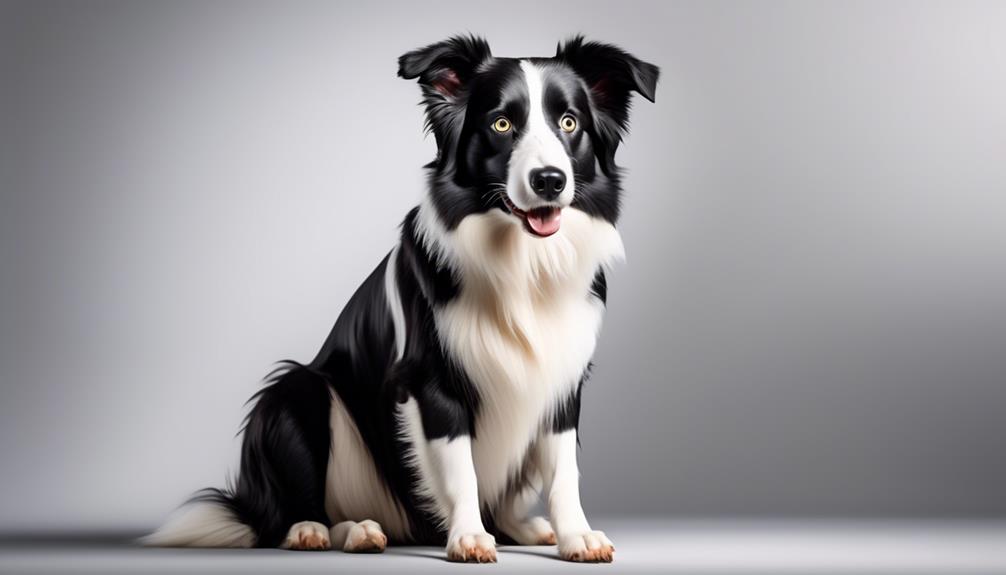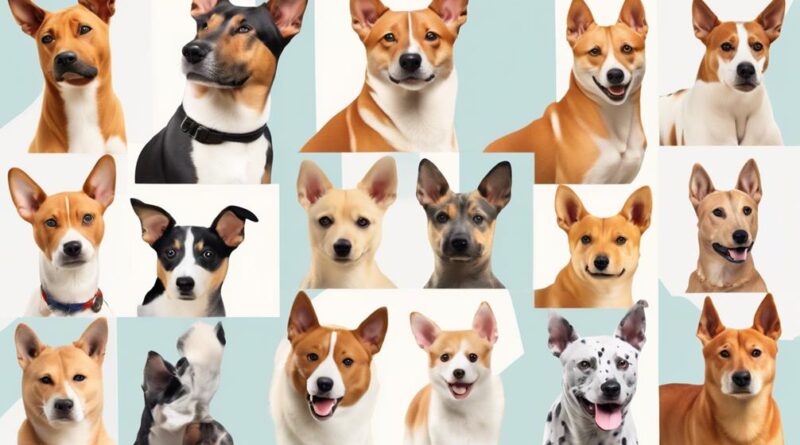Top Dog Breeds With Minimal Health Problems
If you're in the market for a canine companion with a clean bill of health, you'll be pleased to know that some dog breeds are like sturdy ships navigating the unpredictable waters of genetics. These breeds seem to have been blessed with minimal health problems, making them a popular choice for many pet owners.
But before you make a decision, it's important to understand the factors that contribute to their overall well-being and what you can do to maintain it.
Golden Retriever
The Golden Retriever is one of the most popular and beloved dog breeds due to its friendly nature and minimal health problems. When it comes to training tips for Golden Retrievers, consistency is key. These dogs are intelligent and respond well to positive reinforcement. Use treats, praise, and a firm but gentle hand to establish good behavior. Socialization is crucial for Golden Retrievers, so early exposure to various people, animals, and environments is important to prevent shyness or fearfulness. Engaging them in regular exercise and mental stimulation will also help curb any destructive behaviors.
In terms of health maintenance for Golden Retrievers, regular vet check-ups are essential. This breed is prone to certain health issues such as hip dysplasia, cataracts, and certain heart conditions. Maintaining a healthy diet and regular exercise can help prevent obesity, which can exacerbate joint problems. Keep their ears clean and dry to prevent infections, and brush their coat regularly to minimize shedding and prevent matting. Dental care is also important, so regular teeth brushing and dental check-ups are recommended. Finally, be mindful of their weight and avoid overfeeding to prevent obesity-related health issues.
Chihuahua
If you're considering a smaller breed after learning about the Golden Retriever, the Chihuahua may be an option to explore. Chihuahuas are known for their tiny size, but they've big personalities. When it comes to exercise, Chihuahuas don't need a lot of space or intense workouts. A daily walk and some playtime indoors are usually enough to keep them happy and healthy. Due to their small size, they can get enough exercise just by running around the house or apartment. However, it's essential to monitor their activity to prevent them from overexerting themselves.
In terms of socialization, Chihuahuas thrive on companionship. They're known to form strong bonds with their owners and can be quite loyal. Proper socialization is crucial to prevent them from becoming overly protective or anxious around strangers. Exposing them to different people, places, and experiences from a young age can help them grow into well-adjusted and confident dogs. It's important to note that Chihuahuas can be prone to anxiety if not properly socialized, so early and consistent socialization is key.
When it comes to exercise and socialization, Chihuahuas can fit well into various lifestyles, whether in a small apartment or a larger home. With their compact size and moderate exercise needs, they can be a great choice for individuals or families looking for a small dog with minimal health problems.
Beagle
Consider adding a Beagle to your family if you're seeking a friendly and sociable companion with moderate exercise needs. Beagles are known for their gentle and even-tempered nature, making them great family pets. Their social and amiable temperament makes them good with children and other pets, and they often thrive on human interaction. Beagles are curious and fun-loving, always ready for an adventure, making them ideal for active families.
When it comes to exercise, Beagles have moderate needs. They're an energetic breed that enjoys daily walks and playtime. Regular exercise is essential to keep them mentally and physically stimulated. Beagles have a strong sense of smell and love to follow scents, so they should always be kept on a leash or in a secure area when they're outside to prevent them from wandering off in pursuit of an intriguing smell.
It's important to note that Beagles can be a bit stubborn, especially when they catch a scent that piques their interest. Training and early socialization are crucial to help channel their energy and stubbornness in a positive direction. Consistent, patient, and positive reinforcement-based training methods work best with Beagles.
Australian Cattle Dog
Looking for a dog breed with high intelligence and minimal health issues? The Australian Cattle Dog might be the perfect addition to your family. This breed is known for its endurance, agility, and protective nature, making it an excellent companion for those with an active lifestyle.
Here are some key points to consider when thinking about bringing an Australian Cattle Dog into your home:
- Exercise needs
The Australian Cattle Dog is a highly energetic and active breed that requires regular exercise to stay healthy and happy. Daily walks, vigorous play sessions, and interactive activities are essential to keep them mentally and physically stimulated. Providing them with a job to do, such as agility training or obedience trials, can also help fulfill their need for physical and mental challenges.
- Training tips
Due to their intelligence and independent nature, Australian Cattle Dogs benefit from early socialization and consistent, positive reinforcement training. They're quick learners and thrive on mental stimulation, but they can also exhibit strong herding instincts, which may require guidance to ensure appropriate behavior. Engaging in obedience training and giving them clear boundaries from a young age can help prevent behavioral issues later on.
With their striking appearance, unwavering loyalty, and minimal health concerns, the Australian Cattle Dog could be the ideal addition to your household, especially if you lead an active lifestyle and are committed to providing them with the physical and mental stimulation they need.
Poodle
The Poodle breed is known for its intelligence, elegance, and versatility as a companion. When it comes to grooming your Poodle, regular brushing is essential to prevent matting and tangling of their curly coat. Consider professional grooming every 4-6 weeks to maintain their signature look and keep their coat healthy. Additionally, regular ear cleaning and nail trimming are important parts of Poodle grooming to prevent infections and discomfort.
In terms of training, Poodles are highly intelligent and respond well to positive reinforcement. Use reward-based techniques to teach them commands and tricks. Consistent training and mental stimulation are crucial for this breed to prevent boredom and potential behavioral issues. Engaging in activities like obedience training, agility, and interactive play can help keep your Poodle mentally sharp and well-behaved.
When grooming your Poodle, it's important to establish a positive association with the process from a young age. Make grooming sessions a positive and rewarding experience to ensure they're comfortable with the handling and maintenance of their coat. Similarly, training should be a positive and enjoyable experience for your Poodle, strengthening the bond between you and your furry companion.
Shih Tzu
Shih Tzu dogs are known for their affectionate nature and luxurious coat, making them a popular choice for families and individuals alike. If you're considering bringing a Shih Tzu into your home, here are a few essential tips to ensure they thrive in your care:
- Grooming tips: Due to their long, flowing coat, regular grooming is essential for Shih Tzus. Daily brushing helps prevent mats and tangles, while monthly baths keep their coat clean and healthy. It's also important to keep their eyes clean to prevent tear staining, and regular grooming of their ears and nails is crucial for their overall well-being.
- Training methods: Shih Tzus are intelligent and eager to please, but they can also be a bit stubborn. Positive reinforcement methods work best when training them, as they respond well to praise and rewards. Start training early and be consistent, as Shih Tzus can be a bit independent at times. Socialization is also crucial to help them become well-rounded and well-behaved companions.
Border Collie

Highly intelligent and energetic, the Border Collie is renowned for its exceptional herding abilities and unwavering loyalty to its owners. When it comes to training, Border Collies thrive on mental and physical stimulation. To harness their intelligence, engage in varied activities like obedience training, agility exercises, and interactive games. They require consistent, positive reinforcement and thrive when given a job to do, such as herding, obedience trials, or learning new tricks. This not only keeps them mentally sharp but also strengthens the bond between you and your Border Collie.
Owning a Border Collie can bring numerous health benefits. Their active nature encourages owners to engage in regular exercise, promoting a healthier lifestyle for both you and your pet. Regular walks, runs, or hikes provide a great way to keep both you and your Border Collie in top shape.
Despite being a relatively healthy breed, Border Collies are prone to certain health issues, including hip dysplasia, epilepsy, and eye problems. To ensure your Border Collie's well-being, schedule regular check-ups with a veterinarian. Additionally, be mindful of their exercise needs. Due to their high energy levels, Border Collies require ample exercise to prevent behavioral issues stemming from boredom or pent-up energy. Providing them with plenty of physical activity and mental stimulation is crucial for their overall health and happiness.
Bichon Frise
Consider owning a Bichon Frise if you desire a playful and affectionate companion with minimal health issues. Bichon Frises are known for their cheerful disposition and low maintenance in terms of health.
Here are some important tips for grooming and training your Bichon Frise:
- Grooming Tips for Bichon Frise:
To keep your Bichon Frise's coat in top condition, regular grooming is essential. Their curly, hypoallergenic coat requires frequent brushing to prevent matting and tangling. It's recommended to brush them at least three times a week and schedule a professional grooming session every 4-6 weeks. Additionally, regular teeth brushing, nail trimming, and ear cleaning are crucial to maintain their overall health and hygiene.
- Training Methods for Bichon Frise:
Bichon Frises are intelligent and eager to please, making them relatively easy to train. Positive reinforcement methods, such as treats and praise, work best for this breed. Consistent training routines and early socialization are vital to prevent any potential behavior problems. Due to their sensitive nature, gentle and patient training techniques are more effective than harsh discipline.
Frequently Asked Questions
Are There Any Specific Dietary Requirements for These Dog Breeds to Help Minimize Health Problems?
To minimize health problems, specific dietary restrictions and weight management are important for these dog breeds. You should consult with a veterinarian to determine the best diet plan for your dog's breed and individual needs.
What Type of Exercise Regimen Is Best for These Breeds to Maintain Good Health?
For these breeds, regular exercise routines are crucial for maintaining good health. Engaging in activities like brisk walks or playtime offers numerous health benefits, including weight management, muscle tone, and mental stimulation. Consistent exercise routines are key.
Do These Breeds Have Any Specific Grooming Needs to Prevent Health Issues?
Regular grooming techniques for these breeds, such as brushing and bathing, are crucial to prevent health issues. Proper grooming not only keeps their coat and skin healthy but also contributes to overall health maintenance.
Are There Any Common Environmental Factors That Can Affect the Health of These Breeds?
Common environmental factors can affect the health of these breeds, especially considering their genetic predisposition to certain health issues. Providing a consistent exercise routine and mental stimulation can help mitigate these risks.
What Are Some Common Health Problems That May Still Affect These Breeds Despite Their Minimal Health Issues?
Common health problems in these breeds may still include joint issues, skin conditions, and dental problems. Preventive care, proper nutrition, regular exercise, and vet check-ups are crucial to maintain their health and well-being.
Conclusion
So if you're looking for a furry friend with minimal health problems, consider one of these top dog breeds.
From the loyal and friendly Golden Retriever to the low-maintenance Chihuahua, these breeds are known for their overall good health and longevity.
Remember to always provide proper care and regular vet check-ups to keep your pup happy and healthy for years to come!
